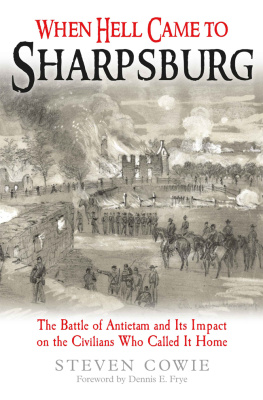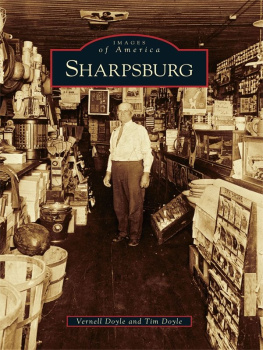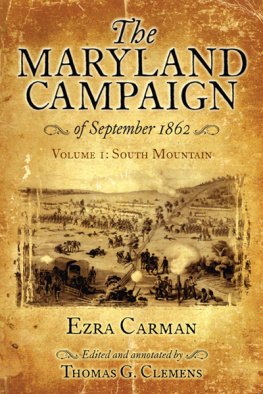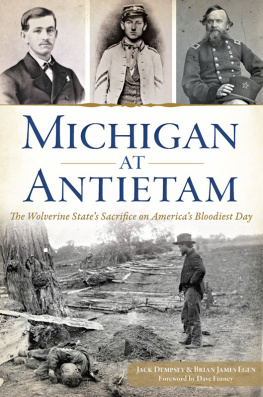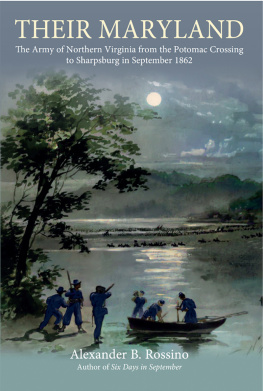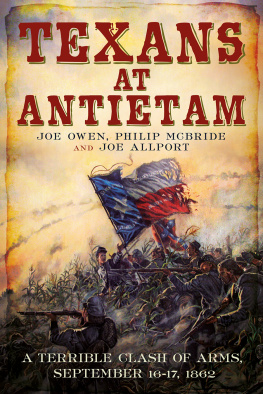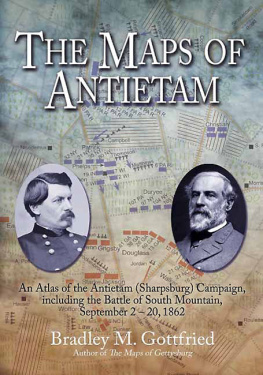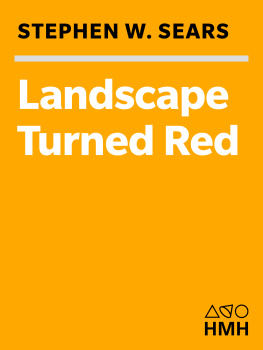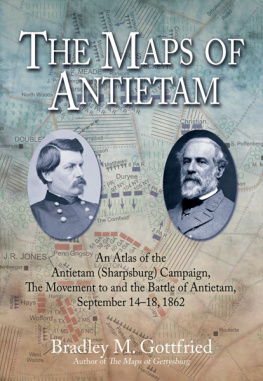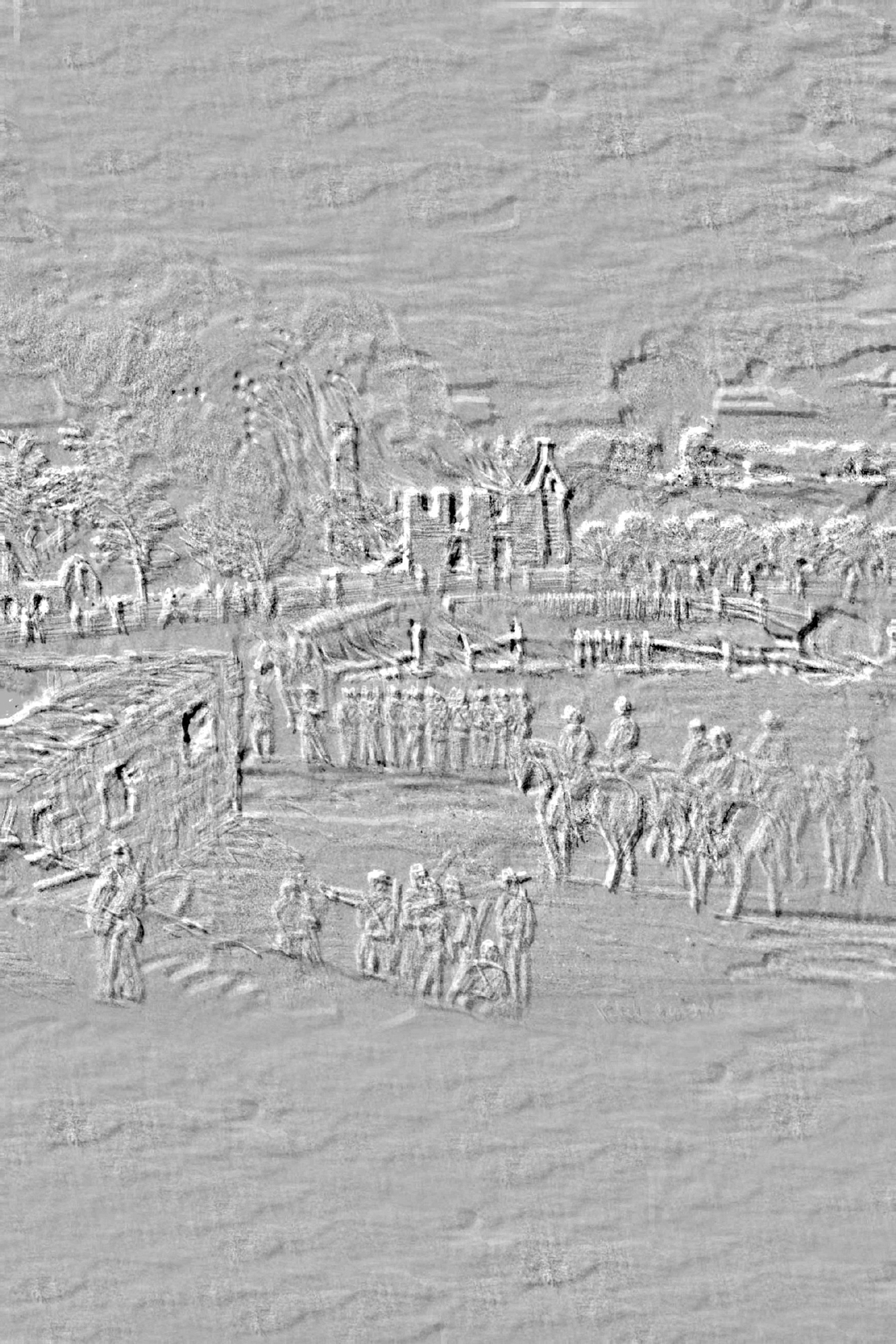Pagebreaks of the print version

W HEN H ELL C AME TO
S HARPSBURG
The Battle of Antietam and Its Impact
on the Civilians Who Called It Home
Steven Cowie
2022 by Steven Cowie
All rights reserved. No part of this publication may be reproduced, stored in a retrieval system, or transmitted, in any form or by any means, electronic, mechanical, photocopying, recording, or otherwise, without the prior written permission of the publisher.
Library of Congress Cataloging-in-Publication Data
Names: Cowie, Steven, author.
Title: When Hell Came to Sharpsburg: The Battle of Antietam and Its Impact on the Civilians Who Called it Home / Steven Cowie.
Other titles: Battle of Antietam and Its Impact on the Civilians Who Called it Home
Description: El Dorado Hills, CA: Savas Beatie, [2022] | Includes bibliographical references and index. | Summary: When Hell Came to Sharpsburg: The Battle of Antietam and its Impact on the Civilians Who Called it Home investigates how Antietam wreaked emotional, physical, and financial havoc on the people of Sharpsburg, Maryland. Author Steven Cowie explores the savage struggle and explains how soldiers stripped the community of resources and spread diseases. Cowie also examines the civilians struggle to recover from their unexpected and often devastating losses Provided by publisher.
Identifiers: LCCN 2022006590 | ISBN 9781611215908 (hardcover) | ISBN 9781611215915 (ebook)
Subjects: LCSH: Antietam, Battle of, Md., 1862. | MarylandHistoryCivil War, 1861-1865 | United StatesHistoryCivil War, 1861-1865Social aspects. | Sharpsburg (Md.)History19th century.
Classification: LCC E474.65 .C69 2022 | DDC 973.7/336dc23/eng/20220210
LC record available at https://lccn.loc.gov/2022006590
First Edition, First Printing
Savas Beatie
989 Governor Drive, Suite 102
El Dorado Hills, CA 95762
916-941-6896 /
Savas Beatie titles are available at special discounts for bulk purchases in the United States. Contact us for more details.
For Alexandra
Photographs have been placed throughout the book for the convenience of the reader.
Foreword
Antietam is personal to me.
My mother, you see, was born a Poffenberger. You will visit with Poffenbergers in these pages. Every chapter, in fact, reveals Poffenberger stories. You will experience their war with war. These are my uncles, my aunts, my cousins. Distant family, indeed; and distanced in time. But I am a Poffenberger.
Antietam is in my genes.
Aficionados who share study of the Civil War often gather at Civil War Round Table meetings and inquire: Did you have an ancestor in the war? The query resonates as if a current event, though nearly 160 years has passed since civil war erupted.
My response perplexes people. Kind of, Ill say. What does that mean? retorts the inquisitor. My ancestors didnt fight the war. Instead, they hosted it.
This is a book about those who hosted the Civil War. The guests were not invited. Rather, they were invaders. All Union and Confederate soldiers at Antietam were unwelcome intruders. In fairness, the two most powerful armies in North America did not target the residents of the Antietam Valley. Happenstance forced their tectonic collision. The ensuing earthquake killed and wounded more American soldiers than any single day in American history. The quakes aftershocks, however, reverberated across generations.
Often we forget that a battlefield, first and foremost, is someones home. Every battle is juxtaposition over a livelihood. Armies arrive, fight, and depart. Battle days are finite. But a battlefield forges itself into the permanent heart of the land and sears into the souls of its caretakers. Too often, we extract the civilians. Our focus on military matters fails to appreciate that not all casualties wear uniforms. We memorialize our battlefields, but we subdue the memories of the hosts.
Steven Cowie resurrects the memory of Antietams resident guardians.
Steves recitation of Antietams citizens will make you shudder. You will feel their burden; you will sense their tragedy. You will experience their devastation; you will share their losses. You will curse in frustration; you will scream in anger. You will shake in their disarray; you will quake in their disharmony.
Cowie captivates your conscience. His untold tales and graphic descriptions are powerfully presentedso much so that you transcend into a Sharpsburg resident. You meld into one with them. The war will violate you. Shatter your peace; break you into pieces. It steals your fortune; robs your dreams. War kidnaps your property and your life; and your government will hold you as ransom.
We have been invadedour fences burnedour wheat crops obliterated from the face of the earthour stock driven offour farms and houses pillaged, proclaimed the areas leading newspaper. Many of us are ruined. We are naked in property as we were in the flesh when we were born into the world. Cannot the Government make some provision for us?
The governments responseor lack thereofforms the basis for much of Cowies investigation. The United States Army, and eventually the U.S. Congress, recognized that private property had been appropriated or destroyed on behalf of the Union war effort. Provisions for payment were ordered or legislatedbut only if supported with mandated paperwork. Fortunately for historians, the government excels at manufacturing paperwork. Skid loads of Civil War-era documents are housed at the National Archives (NARA) in Washington, D.C., including civilian claims for war damages and their requested compensation.
Antietam Valley residents impart a trove within this massive war claims collection. Existence of their claims has been known for decades, but historians have largely ignored it due to difficult accessibility, no digitized or microfilmed copies, and endless transcription of nineteenth-century scribbles. Mr. Cowie cast these obstacles aside. Motivated by the untapped potential within this reservoir of war claims, the author embarked on a multi-year exploration in the secluded vaults of NARA, sacrificing daylight for enlightenment scouring nearly 200 war claims.
The result is a study unmatched. When Hell Came to Sharpsburg is the most comprehensive compendium and scholarly dissertation on the Civil Wars effect upon Antietams citizenry.
This does not diminish the fine Antietam civilian studies of Kathleen Ernsts Too Afraid to Cry (2007) or Ted Alexanders essay Destruction, Disease and Death from the special Antietam issue of the journal Civil War Regiments (1998). Both are significant contributions to Civil War social history, and both established new understandings of epic struggles of survival in Antietams aftermath. Cowie builds upon their foundational work, masterfully weaving details of everyday life into a holistic quilt that rips and shreds into everyday misery.
It is this formulation that differentiates Cowies scholarship. His study examines the effects of war as an ecosystem of expansive horrors . In other words, everything bad makes everything worse. His approach is Newtonian, i.e., every action generates a reaction. It is hard to examine everything, and historians often resort to cherry-picking evidence. Cowie rejects this temptation. His ecosystem is holistic. His narrative interweaves interdependence between life and land. He integrates relationships between natural resources and health and disease. The author intersects social and political intercourse with the dynamics of government action and inaction. He explains economics as agricultural practices (so familiar to these characters and so foreign to us) that define life and death financial decisions. Cowie combines all into a comprehensive web that personalizes the civilian drama and trauma of Antietam.

